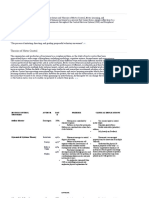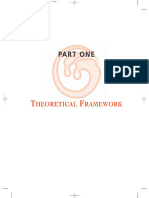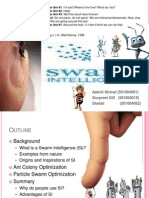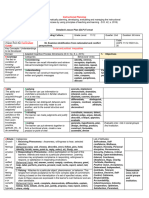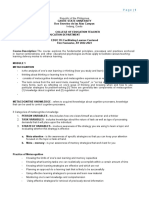0 ratings0% found this document useful (0 votes)
12 viewsInfographic Michelle
Infographic Michelle
Uploaded by
Jisrael OmpadMotor control theory describes the process of initiating, directing, and grading purposeful voluntary movement through various theories. These include reflex theory, which proposes that reflexes are the basis for movement; dynamic systems theory, which implies movement emerges from the interaction of the environment and individual abilities; hierarchical theory, which suggests cortical centers control movement in a top-down manner; motor program theory, which posits that adaptive motor programs and generalized motor programs exist to control common actions; and ecological theory, which states that movement is influenced by the interaction between the person, task, and environment.
Copyright:
© All Rights Reserved
Available Formats
Download as PDF, TXT or read online from Scribd
Infographic Michelle
Infographic Michelle
Uploaded by
Jisrael Ompad0 ratings0% found this document useful (0 votes)
12 views1 pageMotor control theory describes the process of initiating, directing, and grading purposeful voluntary movement through various theories. These include reflex theory, which proposes that reflexes are the basis for movement; dynamic systems theory, which implies movement emerges from the interaction of the environment and individual abilities; hierarchical theory, which suggests cortical centers control movement in a top-down manner; motor program theory, which posits that adaptive motor programs and generalized motor programs exist to control common actions; and ecological theory, which states that movement is influenced by the interaction between the person, task, and environment.
Original Description:
mOTOR CONTROL INFOGRAPHIC
Original Title
INFOGRAPHIC-MICHELLE (1)
Copyright
© © All Rights Reserved
Available Formats
PDF, TXT or read online from Scribd
Share this document
Did you find this document useful?
Is this content inappropriate?
Motor control theory describes the process of initiating, directing, and grading purposeful voluntary movement through various theories. These include reflex theory, which proposes that reflexes are the basis for movement; dynamic systems theory, which implies movement emerges from the interaction of the environment and individual abilities; hierarchical theory, which suggests cortical centers control movement in a top-down manner; motor program theory, which posits that adaptive motor programs and generalized motor programs exist to control common actions; and ecological theory, which states that movement is influenced by the interaction between the person, task, and environment.
Copyright:
© All Rights Reserved
Available Formats
Download as PDF, TXT or read online from Scribd
Download as pdf or txt
0 ratings0% found this document useful (0 votes)
12 views1 pageInfographic Michelle
Infographic Michelle
Uploaded by
Jisrael OmpadMotor control theory describes the process of initiating, directing, and grading purposeful voluntary movement through various theories. These include reflex theory, which proposes that reflexes are the basis for movement; dynamic systems theory, which implies movement emerges from the interaction of the environment and individual abilities; hierarchical theory, which suggests cortical centers control movement in a top-down manner; motor program theory, which posits that adaptive motor programs and generalized motor programs exist to control common actions; and ecological theory, which states that movement is influenced by the interaction between the person, task, and environment.
Copyright:
© All Rights Reserved
Available Formats
Download as PDF, TXT or read online from Scribd
Download as pdf or txt
You are on page 1of 1
MOTOR CONTROL THEORY
Motor Control is defined as the process of initiating,
directing, and grading purposeful voluntary movement.
Motor Control Theories include the production of
reflexive, automatic, adaptive, and voluntary
movements and the performance of efficient,
coordinated, goal-directed movement patterns which
involve multiple body systems (input, output, and
central processing) and multiple levels within the
nervous system.
MOTOR CONTROL THEORIES:
1.) REFLEX THEORY
He believed that for any moment of stimulus enter the body
sensory input is always essential.
Movement is controlled by stimulus-response.
Reflexes are the basis for movement - Reflexes are
combined into actions that create behavior.
How does Reflex Theory work
(Charles Sherrington
1906)
2.) DYNAMIC SYSTEMS THEORY
According to Bernstein's model of motor function, individuals
have the capacity to decide, among a multitude of available
trajectories, of the most suitable trajectory. Dynamic systems
theory implies that there are both possibilities and obstacles
posed by the interaction of the environment and the ability of
the individual to step forward. Movement emerges to control
degrees of freedom.
(Leonard Bernstein
1967)
3.) HIERARCHICAL THEORY
( Adams 1971)
Cortical centers control movement in a top-down manner
throughout the nervous system.
Closed-loop Mode: Sensory feedback is needed and used to control
the movement.
Voluntary movements initiated by “Will” (higher levels). Reflexive
movements dominate only after CNS damage.
4.) MOTOR PROGRAM
5.) ECOLOGICAL THEORY
THEORY
(Schmidt 1976) (Gibson &
Pick 2000)
Adaptive, exible motor programs (MPs) The person, the task, and the
and generalized motor programs environment interact to influence
(GMPs) exist to control actions that motor behavior and learning. The
have common characteristics. interaction of the person with any
Higher-level Motor Programs - Store given environment provides perceptual
rules for generating movements. information used to control movement.
The motivation to solve problems to
Prepared by: accomplish a desired movement task
MANGINLAUD M. goal facilitates learning.
You might also like
- Duarte Applied Motor Control and Learning Exercise, Sports and DanceDocument49 pagesDuarte Applied Motor Control and Learning Exercise, Sports and DanceZedy Gulles100% (5)
- Theories of Motor LearningDocument58 pagesTheories of Motor LearningIndira Naidu Boddapati67% (6)
- Introduction To Theories of Neurological RehabilitationDocument30 pagesIntroduction To Theories of Neurological RehabilitationHibaAli80% (5)
- Bernstein Turvey Kelso & Tuller Thelen 1967 1977 1984 1987Document5 pagesBernstein Turvey Kelso & Tuller Thelen 1967 1977 1984 1987Jewel GuintoNo ratings yet
- BPE16 - (Chapter 4 - BPED 3)Document8 pagesBPE16 - (Chapter 4 - BPED 3)Terry Jane JavelinaNo ratings yet
- Chapter 1 Bped 3Document11 pagesChapter 1 Bped 3Renzo Jake100% (1)
- Applied Motor ControlDocument8 pagesApplied Motor Controljeanrose.maderazoNo ratings yet
- Motor Skill - The Ability To Execute Movement in An: Optimal Fashion Motor Behavior Study Is Trying To Find Out HowDocument21 pagesMotor Skill - The Ability To Execute Movement in An: Optimal Fashion Motor Behavior Study Is Trying To Find Out HowTrophyCana XinNo ratings yet
- Motor ControlDocument8 pagesMotor Controlarold bodoNo ratings yet
- Chapter 5Document43 pagesChapter 5Kate HirschNo ratings yet
- 002 - Libro InglesDocument48 pages002 - Libro Inglesdavid castañedaNo ratings yet
- Topic 3 Dynamical System TheoryDocument3 pagesTopic 3 Dynamical System TheoryRellan YbanezNo ratings yet
- MotorDocument20 pagesMotorJames BaccayNo ratings yet
- Ompad Bpe-122 InfographicDocument1 pageOmpad Bpe-122 InfographicJisrael OmpadNo ratings yet
- PED 103 ReportDocument10 pagesPED 103 Reportecellepenaranda16No ratings yet
- Introduction of Motor Behavior: Motor Skill - The Ability To Execute Movement in AnDocument21 pagesIntroduction of Motor Behavior: Motor Skill - The Ability To Execute Movement in AnHelmi RaisNo ratings yet
- Major 4 - ActivitiesDocument10 pagesMajor 4 - ActivitiesJasper Diñoso JacosalemNo ratings yet
- Motor Control: Sensorimotor FeedbackDocument2 pagesMotor Control: Sensorimotor FeedbackMOHAMAD ASRI YAHAYA100% (1)
- Theories of Motor Control KMCDocument55 pagesTheories of Motor Control KMCSandeep KadlagNo ratings yet
- Theories of Motor ControlDocument33 pagesTheories of Motor ControlArslan Aslam100% (4)
- LIVRO - Shumway-Cook - MOTOR CONTROLDocument147 pagesLIVRO - Shumway-Cook - MOTOR CONTROLpereiradasilvafisioterapeutaNo ratings yet
- SLD 1 Controle MotorDocument38 pagesSLD 1 Controle MotorKelly Sousa CarvalhoNo ratings yet
- Motor Control Theories: Presented By: PETETI SAIRAM MPT 2 YearDocument28 pagesMotor Control Theories: Presented By: PETETI SAIRAM MPT 2 YearSai RamNo ratings yet
- The Neural Basis of Motor-Skill Learning: Current Directions in Psychological Science December 1999Document6 pagesThe Neural Basis of Motor-Skill Learning: Current Directions in Psychological Science December 1999Charitini PetridouNo ratings yet
- Theoretical Basis of Treatment TheraExDocument8 pagesTheoretical Basis of Treatment TheraExLall JingerppangNo ratings yet
- Summary Notes For MovementDocument2 pagesSummary Notes For Movementbobadilla.sarah19No ratings yet
- Prepared By: Dr. Qindeel ShafaqDocument30 pagesPrepared By: Dr. Qindeel ShafaqHibaAliNo ratings yet
- Neurological Physical Therapy Course Code: Shs 422Document53 pagesNeurological Physical Therapy Course Code: Shs 422AbdullahNo ratings yet
- Anticipatory Mechanisms of Human Sensory-Motor Coordination Inspire Control of Adaptive Robots: A Brief ReviewDocument14 pagesAnticipatory Mechanisms of Human Sensory-Motor Coordination Inspire Control of Adaptive Robots: A Brief ReviewBrix Gerald FailmaNo ratings yet
- Report-9 1168891Document2 pagesReport-9 1168891NeeharikaNo ratings yet
- Motor ControlDocument34 pagesMotor ControlShree PatelNo ratings yet
- Pe 109 Midterm Review QuestionsDocument11 pagesPe 109 Midterm Review Questionsjhonielgueco007No ratings yet
- Lesson 2 Theoretical Models of Motor Control and Learning 1Document46 pagesLesson 2 Theoretical Models of Motor Control and Learning 1Elvis MasigaNo ratings yet
- 2023 Article 1235Document17 pages2023 Article 1235frambuesas0danNo ratings yet
- 2023 Modeling motor control in continuous-time Active Inference- a surveyDocument31 pages2023 Modeling motor control in continuous-time Active Inference- a surveyadrianaperrellamNo ratings yet
- Pathfit 1 2 AeDocument8 pagesPathfit 1 2 Aeatsytics16No ratings yet
- Anhokin Theory of FucntionalDocument6 pagesAnhokin Theory of FucntionalrorozainosNo ratings yet
- Motor Control TheoryDocument9 pagesMotor Control TheoryJuan Claudio López MonardezNo ratings yet
- Maneuverable ExoDocument12 pagesManeuverable ExoAbusabah I. A. AhmedNo ratings yet
- ECE Swarm Intelligence (SI)Document34 pagesECE Swarm Intelligence (SI)anamika singhNo ratings yet
- HIRADocument6 pagesHIRAAdenosine DiphosphateNo ratings yet
- Theories of Motor LearningDocument29 pagesTheories of Motor Learningpal100% (1)
- Cyber Physical System Challenges For Human-in-the-Loop ControlDocument4 pagesCyber Physical System Challenges For Human-in-the-Loop ControlCem KeskinNo ratings yet
- Scalable Muscle-Actuated Human Simulation and Control: Seunghwan Lee, Moonseok Park, Kyoungmin Lee, Jehee LeeDocument13 pagesScalable Muscle-Actuated Human Simulation and Control: Seunghwan Lee, Moonseok Park, Kyoungmin Lee, Jehee Leesouaifi yosraNo ratings yet
- TriChapter57-09-Nervous SystemDocument8 pagesTriChapter57-09-Nervous Systembao.nguyenthienadamsNo ratings yet
- A Simple Adaptive Locomotion Toy-SystemDocument11 pagesA Simple Adaptive Locomotion Toy-SystemttttNo ratings yet
- Calm. We Are Going Around The Leaf.: A Bug's Life, Walt Disney, 1998Document30 pagesCalm. We Are Going Around The Leaf.: A Bug's Life, Walt Disney, 1998Dinesh SharmaNo ratings yet
- Haggard 2005 Conscious IntentionDocument6 pagesHaggard 2005 Conscious IntentionCaio MesquitaNo ratings yet
- Motor Control TheoriesDocument26 pagesMotor Control TheoriesSardarChangezKhanNo ratings yet
- Group 2-Written - Report-Bped155-FinalDocument10 pagesGroup 2-Written - Report-Bped155-FinalJoyce MacerianoNo ratings yet
- Motor Control TheoriesDocument94 pagesMotor Control Theoriespop67No ratings yet
- Social Work Theories ListDocument11 pagesSocial Work Theories ListKok Sieng Joshua ChangNo ratings yet
- Muscle Force Distribution For Adaptive Control of A Humanoid Robot Arm With Redundant Bi-Articular and Mono-Articular Muscle MechanismDocument11 pagesMuscle Force Distribution For Adaptive Control of A Humanoid Robot Arm With Redundant Bi-Articular and Mono-Articular Muscle MechanismpaperopenaccessNo ratings yet
- Quantifying Dynamic Stability and Maneuverability in Legged LocomotionDocument9 pagesQuantifying Dynamic Stability and Maneuverability in Legged Locomotionisbro1788No ratings yet
- 64 Dynam Stab PDFDocument9 pages64 Dynam Stab PDFisbro1788No ratings yet
- Callista Roy TheoryDocument13 pagesCallista Roy TheorySimon Josan100% (1)
- Human Musculoskeletal BiomechanicsDocument254 pagesHuman Musculoskeletal Biomechanicsuilifteng100% (2)
- SBMA1403Document88 pagesSBMA1403DavidConversNo ratings yet
- Functional Rehabilitation of Some Common Neurological Conditions: A Physical Management Strategy to Optimise Functional Activity LevelFrom EverandFunctional Rehabilitation of Some Common Neurological Conditions: A Physical Management Strategy to Optimise Functional Activity LevelNo ratings yet
- Bao-As Vince - Gpe2 (6128) - Matching TypeDocument1 pageBao-As Vince - Gpe2 (6128) - Matching TypeJisrael OmpadNo ratings yet
- Jisrael Ompad - UloeDocument4 pagesJisrael Ompad - UloeJisrael OmpadNo ratings yet
- Bpe 113Document98 pagesBpe 113Jisrael OmpadNo ratings yet
- Ompad Bpe-122 InfographicDocument1 pageOmpad Bpe-122 InfographicJisrael OmpadNo ratings yet
- Group Investigation Based Learning Improves Students' Productive Disposition and Mathematical PowerDocument12 pagesGroup Investigation Based Learning Improves Students' Productive Disposition and Mathematical PowerhamidahNo ratings yet
- Englis Test Item BankDocument2 pagesEnglis Test Item Bankeliezar PayusanNo ratings yet
- FS2 Le15Document5 pagesFS2 Le15John Michael TapallaNo ratings yet
- The Impact of Learning Stategies On Stem Student of Private Catholic SchoolDocument7 pagesThe Impact of Learning Stategies On Stem Student of Private Catholic SchoolRD SuarezNo ratings yet
- DLP Ucsp 30Document5 pagesDLP Ucsp 30Jeanne AndradeNo ratings yet
- Introduction To Psychological Science Canadian 1st Edition Krause Solutions ManualDocument64 pagesIntroduction To Psychological Science Canadian 1st Edition Krause Solutions Manualletitianamfrfbt100% (45)
- Course Outline ELE 706Document21 pagesCourse Outline ELE 706Ralph Benedict CruzNo ratings yet
- Tlsc-Sequence6 - CurrDocument11 pagesTlsc-Sequence6 - Currapi-470362666No ratings yet
- Directed Motivational Currents in L2: Nourollah Zarrinabadi Saeed Ketabi Mansoor TavakoliDocument21 pagesDirected Motivational Currents in L2: Nourollah Zarrinabadi Saeed Ketabi Mansoor Tavakolinurerliza15No ratings yet
- Basic Arts CriticismDocument10 pagesBasic Arts Criticismainevill83No ratings yet
- Module 1 - Concept and Nature of Self: Who Am I?Document9 pagesModule 1 - Concept and Nature of Self: Who Am I?Lynjie Samaco VillamorNo ratings yet
- EDUC 70 Module 1Document6 pagesEDUC 70 Module 1Leslie mae GioNo ratings yet
- Developing A Health Education Plan 1Document56 pagesDeveloping A Health Education Plan 1renz bartolomeNo ratings yet
- Science 4Document2 pagesScience 4Sarah Jane SeñaNo ratings yet
- Sustain 2gs3 - Mind Map f23Document2 pagesSustain 2gs3 - Mind Map f23karimnile7No ratings yet
- Test Bank For Leadership Theory Application and Skill Development 5th Edition Lussier Achua 1111827079 9781285127361Document36 pagesTest Bank For Leadership Theory Application and Skill Development 5th Edition Lussier Achua 1111827079 9781285127361RandallQuinnjaqk100% (31)
- Plan Your Learning With The LEGO® Education Competency-Based FrameworkDocument9 pagesPlan Your Learning With The LEGO® Education Competency-Based FrameworkEdnaldo Alexandre Zandona100% (1)
- Delm 215 Instructional Models For Improving Student AchievementDocument3 pagesDelm 215 Instructional Models For Improving Student Achievementarmand resquir jrNo ratings yet
- Chapter 3 - BPTNCDocument24 pagesChapter 3 - BPTNCDave Lustin A. CainongNo ratings yet
- Bias and Prejudice g9Document24 pagesBias and Prejudice g9Ronald Randolph delaCruz ValezaNo ratings yet
- Knowing OneselfDocument20 pagesKnowing OneselfRusty Ugay LumbresNo ratings yet
- Chapter 2 Eyes of FaithDocument2 pagesChapter 2 Eyes of FaithJeanette R CoxNo ratings yet
- Black Doodle Tools For Generating Ideas InfographicDocument1 pageBlack Doodle Tools For Generating Ideas InfographicAiltonNo ratings yet
- Lec 2, Effective Writing As An ArtDocument13 pagesLec 2, Effective Writing As An Artpiyush joshiNo ratings yet
- GestaltDocument5 pagesGestaltayminqureshi987No ratings yet
- One EssayDocument2 pagesOne Essaypatriciazambranovargas123No ratings yet
- Crim 6 RRLD PRELIMDocument2 pagesCrim 6 RRLD PRELIMGarcia Rowell S.No ratings yet
- Activity 6 - Kohlberg Vygotsky Bronfenbrenner TheoriesDocument8 pagesActivity 6 - Kohlberg Vygotsky Bronfenbrenner Theorieszde eamNo ratings yet
- 2868 8241 1 SMDocument8 pages2868 8241 1 SMNatasya MiawNo ratings yet
- DLL English-6 Q1 W6 MelcsDocument8 pagesDLL English-6 Q1 W6 MelcsRomnick PadolinaNo ratings yet








